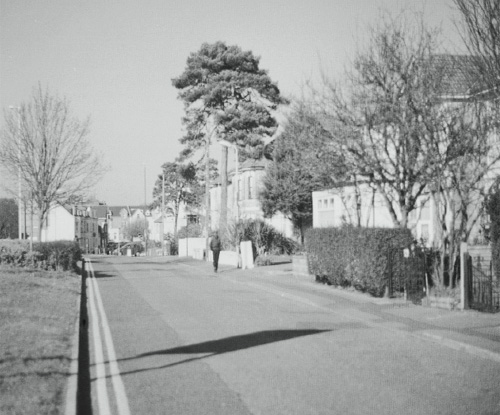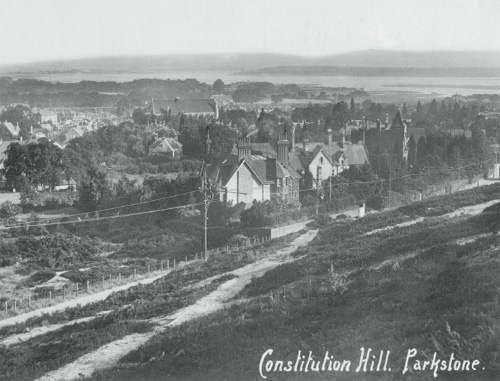Dorset Murders (19 page)
After twelve months of living happily in St Swithun's Road, their landlady hesitantly approached Robert with some bad news. She had to move house but, if they wanted, there was plenty of room for the family at her new home, including the baby that Beatrice was expecting. Robert and Beatrice were delighted and began to prepare for the move. However, their hopes of continuing with their happy domestic arrangements were suddenly and unexpectedly dashed when the firm that Robert worked for announced that they were to close.

St Swlthun's Road, Bournemouth, 2008. (
©
N. Sly)
Without a job and a regular wage, Robert did not feel comfortable impinging on their landlady's goodwill and, although she pleaded with them to move, saying that she was happy to wait for the rent until Robert found another job, the proud, independent Robert just could not bring himself to be indebted to her.
When the house at St Swithun's Road was sold up, he moved his family into another rented home in Bournemouth Road, Parkstone. A second daughter, Amy Violet, arrived shortly afterwards. Robert spent his days walking the streets looking for work and the evenings playing with his children or sitting quietly with Beatrice in their sparsely furnished rooms. He continued to promise Beatrice that, one day, things would get better and that they would have a house of their own, rather than paying rent to other people.
The Wright family was in dire financial straits but, in August 1925, things gradually began to improve. It was then that Beatrice was reunited with Frederick Giles, her long-estranged father, who was finally introduced to the son-in-law and grandchildren he had never met. When father and daughter had a few moments alone together, Fred asked Beatrice if she was happy. âLife has been tough of late, Dad', Beatrice admitted, but was quick to add that she had a really good man who couldn't do enough for her and her children.

Constitution Hill, Parkstone
.
Then, just a short while later, Robert Wright finally found a new job, starting work for local builder Mr Hoare on 17 August.
Wright was a resounding success at his new place of work. According to his foreman, William Howe, he was a working machine, ready to tackle any job given to him, no matter how hard or how unpleasant. When Mr Hoare asked if Wright were worth the money he was being paid, Howe told him that he could pay him ten times his current wage and still be getting a bargain. Yet, no matter how impressed he was with his employee, Hoare could only afford to pay him a basic wage and, after Wright's period of unemployment, during which the couple had found themselves with outstanding accounts to tradespeople, he found himself gradually slipping further and further into debt.
Matters came to a head when young Amy Violet fell ill. The only food that Beatrice could afford to feed her children was the cheapest possible available and it was far from a healthy, nutritious diet. Now, Amy Violet lay in her makeshift cot, feverish and sick, and, having already pawned all but the bare necessities, her parents were too poor to send for a doctor to treat her.
Both parents took it in turns to sit up all night with their poorly daughter, trying their hardest to keep her warm and comfortable, with Robert always putting in a full day's work despite his lack of sleep. However, the hard work and exhaustion began to tell on him and he went down with a bad attack of influenza. He refused to let his illness prevent him from working, telling Beatrice that it was just a cold and continuing to cycle to his job every day as he had always done.
Beatrice was now unable to obtain even milk to feed her children, since her account with the dairy was long overdue. Her family was kept alive only by the kindness and compassion of Mr Chalkley, the milkman, who continued to allow her to have a little milk every day, even though she had already run up a substantial bill.
Robert's employer and work colleagues noticed that he was looking pale and worn, even though he refused to let his work rate slip because of his illness. He allowed himself one day off work on Christmas Day â a day like every other in the Wright household, since no money could be found for any form of celebration â then he resumed working, still feeling weak and complaining privately to Beatrice, âMy head feels awful queer'.
Somehow, Beatrice managed to scrape up enough money to pay off some of the arrears she owed for milk, but that left her short of money to pay Mr Jewlett, the coal merchant, and soon he too was refusing to deliver. Jewlett sympathised with the Wrights but he had a business to run. Eventually, he agreed that, although he wouldn't allow the family to have any more coal, he would also not pressure them for payment of the outstanding bill for the two hundredweight of coal that they had already received and not yet paid for.
On New Year's Day 1926, Robert Wright dropped a bombshell. He went to see Bill Howe, his foreman at Hoare's and handed in his notice with immediate effect. Howe asked him if he had another job to go to, but the taciturn Wright would only say that he had, without offering any more details.
Beatrice was shocked and horrified when he broke the news of his unemployment to her that evening, even more so when Robert told her that he had resigned rather than been laid off or sacked. However, Robert assured her that he had a plan and, trusting his judgement, she didn't push for more information, accepting that he would tell her when he was good and ready.
It was January. The weather was cold and wintry and Robert and Beatrice were living in rented accommodation without the means to heat it and too poor to buy food for themselves or their two daughters. As before, it was Chalkley the milkman who came to the rescue. He had become very fond of the two little girls, Marjory, now three years old and Amy Violet, aged twenty-two months, and, unpaid bills or not, he couldn't bear the thought of the children starving for want of milk. Hence he continued to ladle milk into Mrs Wright's jug each day and to accept her constant promises that he would be paid in full very soon.
Wright left the house briefly on 5 January to collect his tools from Hoare's. Apart from this one short excursion, none of the Wright family was seen outside the house and, when tradesmen to whom they owed money knocked on the door, their knocks went unanswered.
On 26 January 1926, Chalkley again decided to try and collect some of his outstanding bill. He knocked on the door of the Wright home and was not particularly surprised to receive no reply. However, as he was leaving, he happened to glance down and noticed that the jug of milk that he had filled for Beatrice the previous day was still standing untouched on the doorstep. Recognising that something was seriously wrong, he immediately went to the police and at half-past two in the afternoon; PC Lake arrived in Bournemouth Road to investigate.
He managed to gain entrance to the property by a broken pane of glass in the back door. The blinds were drawn and the house was in partial darkness. Lake made his way carefully across the deserted living room and upstairs to the bedroom, where the blinds were also drawn closed. As he opened the bedroom door, Lake was aware of something heavy falling against his foot. As his eyes gradually became accustomed to the dim light, he realised that he was facing a pair of double beds and in those beds lay all four members of the Wright family, all of them dead. Averting his eyes immediately from the gruesome scene of carnage that faced him, Lake looked down to see what had fallen against his foot. It was a heavily bloodstained axe.
Lake rushed to summon assistance and before long reinforcements arrived in the form of PC Trevis and Dr Patterson. Struggling to keep his balance on a floor slippery with spilled blood, Patterson ascertained that Beatrice and the two girls had been almost decapitated by the axe. Robert, dressed in just trousers and stockinged feet, lay across the foot of the bed, a razor at his side, with several gaping cuts across his throat. All had been dead for more than twenty-four hours.
Police began a search of the house and found a bloodstained collar downstairs on the kitchen table. On the mantelpiece lay a shilling and two sixpences and a holdall was found that contained little else but Robert Wright's insurance card. Apart from that, the house was woefully bare, its occupants having pawned almost everything they owned in a desperate struggle to survive. Neighbours were interviewed and, although they could offer little insight into the tragedy, one did recall hearing a scream the previous Sunday, which appeared to come from the direction of the Wright's house.
An inquest was opened into the deaths of Robert, Beatrice and the two little girls who had been formally identified by Beatrice's father, Mr Giles. Mr Hatton Budge, the coroner, professed himself to be mystified at the circumstances regarding the family's deaths. Nobody could be found who knew why the Wrights had moved to Bournemouth from Manchester â if indeed it had been Manchester they had come from. Mr Giles told the coroner that he could only think of one person â Robert's brother â who might be able to shed some light on the Wright's recent life. However, he did not know the brother's name or address, beyond thinking that he was living somewhere in New Jersey, America.
Dr Patterson had conducted post-mortem examinations on all four bodies and had determined that death for the two girls had at least been relatively quick. Both were dressed in their nightclothes and lay as if sleeping, one still clutching a ragged doll. The cause of death for Marjory and Amy Violet was given as the severing of their spinal cords by injuries to the back of the neck, caused by the axe found in the bedroom.
For Beatrice Wright, the end had been less swift. The fact that one of her neighbours had heard a scream seemed to suggest that she had been awake when she was attacked and received a large wound to the back of her head. When found, she was sitting partially upright, rather than lying down and Patterson believed that she had been aware of what was about to happen and had begun to take evasive action. Robert, Patterson stated, had cut his own throat with a razor.
With so little known about the Wright family and their circumstances, all the coroner's jury could do was to return a verdict that Robert Percy Wright had killed his wife and children and then himself while temporarily insane.
A funeral was held for the family and, unusually, Robert was allowed to be buried with his family. (Frequently those who committed suicide were not permitted a burial in consecrated ground.) Their funeral attracted large crowds, but among those were very few people who had actually known the Wright family in life. Even Mr Giles, the only relative to attend, was a virtual stranger, having only recently met the daughter from whom he had been estranged for many years.
The family were buried in a double grave in Parkstone cemetery. Unsurprisingly, no form of headstone has ever been erected to mark their final resting place or their memory.
âI WILL HAVE YOU ALL, ONE AT A TIME'

